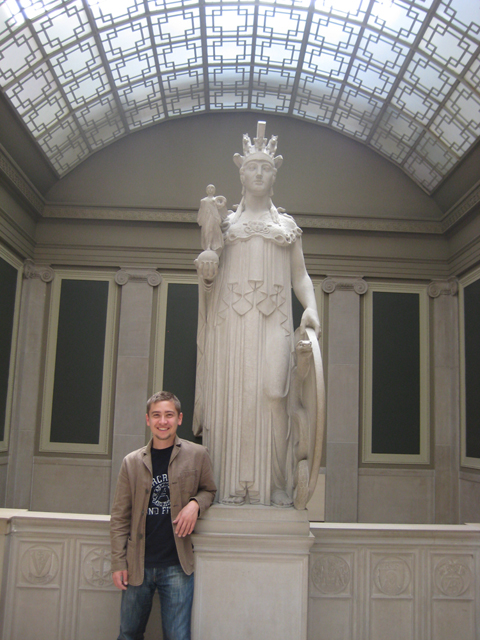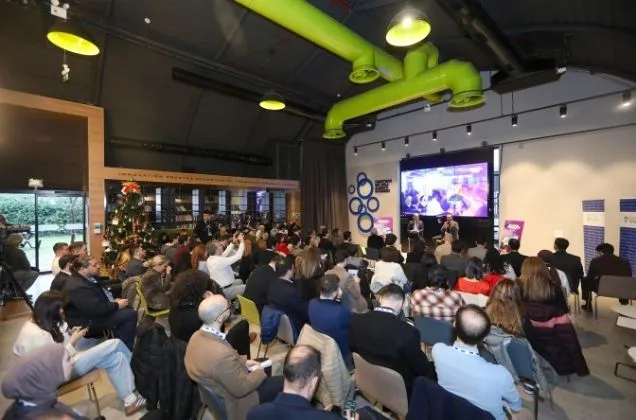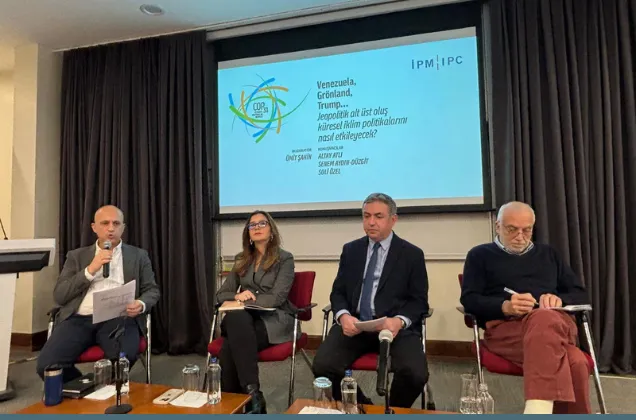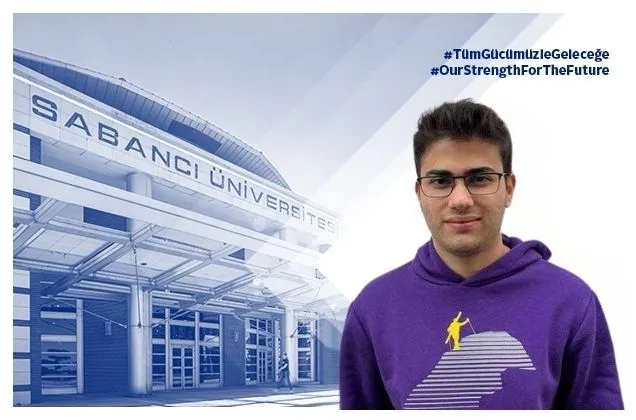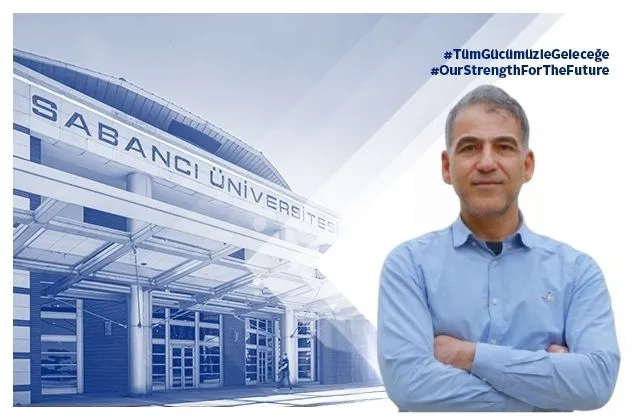01/02/2015
Kerim Can Kavaklı: When I started in Sabancı, I was surrounded by, and was classmates with, people who were more intelligent than anyone I would meet later in life. You may have heard others say that they were a group of extremely smart, successful and special people. It was sobering to be in the same class with them; you had to come down to earth because they were extremely clever and knowledgeable. Graduates of science schools ground us into dust in science classes. Think of the bell curve in regular courses. Ours was like the back of a Bactrian camel.
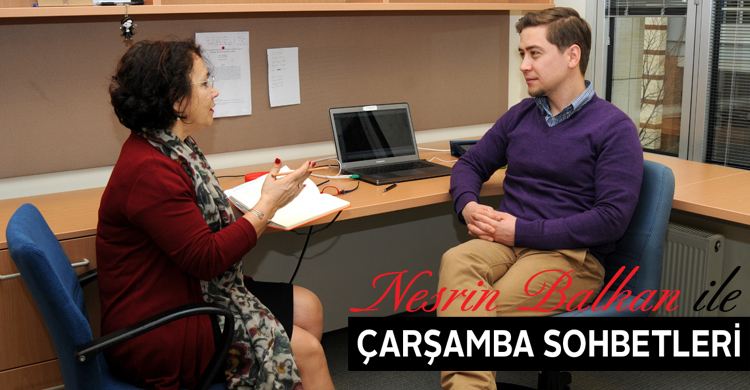
Wednesday Talks with Nesrin Balkan
The first interview of 2014 is with Kerim Can Kavaklı, who was among the first students of Sabancı University in 1999, and now is a faculty member in the Faculty of Arts and Social Sciences. Our Board of Trustees Chair Güler Sabancı says about the first students: “They were brave kids. We told them our dreams; they believed in us, trusted us, and they came to Sabancı University.” Kerim Can Kavaklı is one of those “brave kids” who chose Sabancı University at a time when there wasn’t even a campus, just a vision and plans. We spoke to Kerim Can Kavaklı on his university years, ways of students, education, and his interest in social sciences. The second part of this interview will be available next week.
You are one of the first Sabancı University students. What would you like to tell us about that time?
I spent most of my life around here. Before Sabancı, I was in the Koç High School, which is nearby. That was 7 years of my life. Then, I was among the first 250 students admitted to Sabancı University in 1999. As I passed the English exam, I was one of the 50 people who skipped preparatory year went straight into university courses – so I was the first among the firsts. The school was very small, classes were very small, most of the buildings didn’t exist – even the cafeteria.
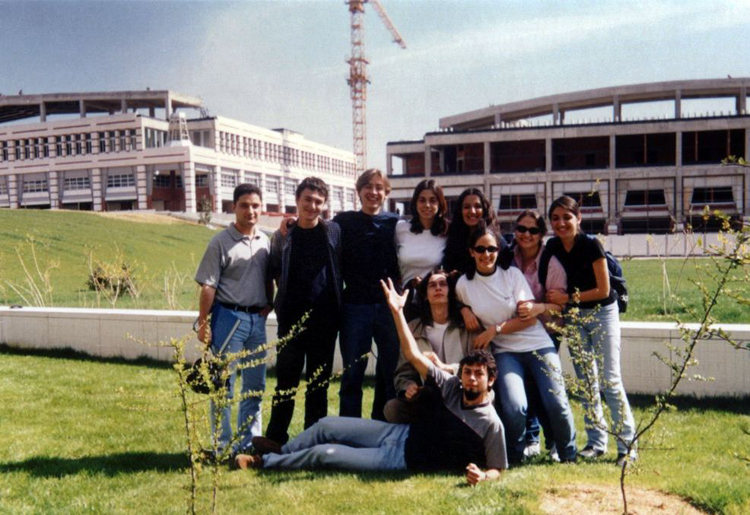
We had a small place by the dorm halls that we used as a cafeteria.
Yes, that small shop was where we all ate.
I remember it used to be called Cafe Dorm.
All our classes were in what is the School of Languages now. We had one large hall; 50 of us crammed in there for the first year courses. The Nature and Science class was in the Rector’s Hall. As the school continued to grow and faculty buildings were complete, we chose our diploma programs. I chose Social and Political Sciences. After graduation, I went to Rice University for master’s and the University of Rochester for my doctorate. Rochester is one of the best schools in international relations, particularly in mathematical and statistical methods in political science. After getting my degree in Rochester, I returned to Turkey, to Sabancı University as a faculty member.
So Sabancı is your first academic experience.
Yes.
Did you give lectures at Rochester during your doctorate?
That depends on the school. In large state universities like Michigan State, you will have several courses of our own. They don’t want that in private universities like Rochester, both because there are enough lecturers for the relatively small student community, and because students who pay over $50,000 a year in tuition fees don’t want to be lectured by a PhD student. I didn’t give lectures, but I was a teaching assistant.
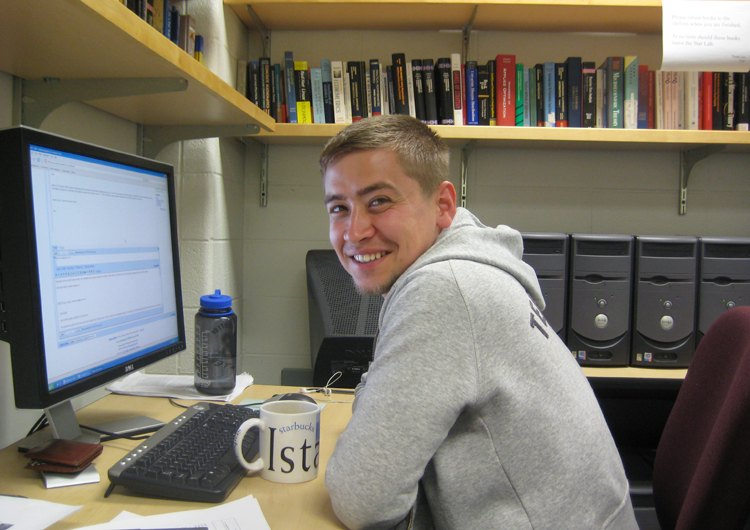
You were one of the first undergraduate alumni in 2003. You returned to Sabancı University a decade later as a lecturer. What differences did you observe?
Physically, there is a huge difference. The campus is much prettier and greener compared to 10 years ago. The number of faculty has vastly increased. Most people I knew as a student are gone of course, but the number of academics has increased. There are many new programs which come with a host of different courses. This was a strong academic institution even when I was a student, but now there is much greater choice. I think this is the greatest difference.
Has the student profile changed from the time you were a student?
I could be doing current students some injustice because I don’t remember much about my time as a student; I don’t remember how hard I worked or what else I did. I have been involved in master’s and doctorate programs for 9 years where the schedule is hectic and you have to take the initiative all the time. Undergraduate education is not the same kind of experience; students at this stage have lots more to do with their lives than just sit in classes and take notes. I am now frustrated when my undergraduate students skip some reading they were supposed to do, but when I was their age, I was probably doing the same. The group of students that took my first course here last semester were all staggeringly clever. It was a small class of 10 people, but they were all seniors. They were very bright and I loved to sit and talk to them, discuss with them. I’m not sure if we were as smart as they were – I hope we were. It seems to me like we worked harder and did more reading, but that was nine years ago and my memory could be playing tricks on me.

Would you recommend students to seek master’s or doctorate degrees?
Absolutely. I joined the introduction event for the SPS program, which was my major. At the meeting, program coordinator Özge Kemahlıoğlu asked me as a graduate to talk about where my fellow students were and what they did. We were a very small group of 50 people. At the commencement in 2003, there were only 48 of us. Most of my friends are in very good places and almost all have master’s degrees. I believe that a graduate degree is a must today.
So would you say that a student should seek a master’s or even a doctorate degree although their plan is not an academic career?
In social sciences, the purpose of a doctorate is to create academics. If you are not going to become an academic and go back to the university for research and teaching, a doctorate is not imperative. The purpose of a PhD is to break you in to some literature, and then provide you with the environment to do research and make academic inventions. If you are not interested in these, it is better to join a master’s program that will prepare you to work in a company or an NGO. Not everyone has to dedicate 5 or 6 years to a doctorate. But I think a master’s degree is important and necessary.
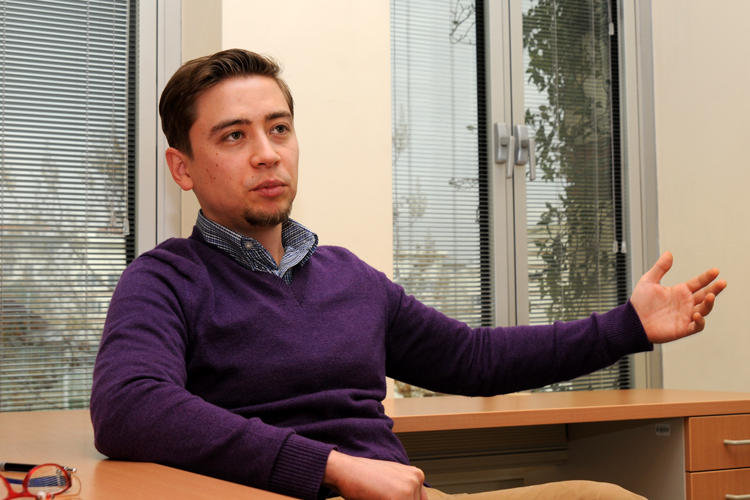
Young people in Turkey are in a pinch: unemployment is a great worry. One needs a good education to shine among the crowd. This makes a master’s degree even more important.
The job market is always difficult, even more so today. There are things in life that you can change, and other things that you can’t. Take your height: it is an important attribute that you cannot change. Research suggests that taller people receive more job offers, are paid higher salaries, and are promoted more quickly.
So taller people have a better chance of being hired?
That’s what the findings suggest. I don’t know if taller people are just picked over others, or if they are brighter than others as well. It’s really difficult to say.
Appearance seems to be a factor.
What matters is this: Your stature or intelligence are things that you cannot change. But education is something you can, and if you have arrived at Sabancı University, it is likely that you have some advantages that run in your family or in your past. Add to that the education and connections at Sabancı, and you can develop much further. This is a great opportunity that people must use.
Was Sabancı University an informed choice?
Not for me. I was 18, and no one is informed enough to make a choice at that age. But it turned out to be a brilliant choice. My family checked the faculty members here, and I was entitled to a scholarship. That’s how I decided.
You were an achiever if you had won a scholarship.
I was. And speaking of scholarships, let me tell you an anecdote. When I started in Sabancı, I was surrounded by, and was classmates with, people who were more intelligent than anyone I would meet later in life. We were in a small environment, taking courses together. You may have heard others who were here at the time say that they were a group of extremely smart, successful and special people. The professors were great too, but the students were amazing.

Well, they were your friends.
Here is the anecdote: I skipped preparatory year and started university courses. All 50 of us were in the same hall. I noticed that 6 or 7 people were carrying the same type of backpack. It wasn’t a known brand or anything; just a navy backpack with a round logo on it. I assumed they had all bought them from the same place. One day, I sat next to one of them and I checked to see what the logo said. It said “World High School Mathematics Olympics.” Then I checked the others; they weren’t all mathematics. One was chemistry, the other computer science. Among those 50 students were 6 or 7 people who had represented Turkey in the Olympics. I was a good, hardworking student, but I must admit that I probably wasn’t the brightest star among them.
This sounds like humility; you were among that group as well. One of the conditions for Sabancı scholarships back then was representing Turkey in the Science Olympics. That brought a number of excellent students to Sabancı.
I should imagine. But then you had to take university courses together. It was sobering to be in the same class with them; you had to come down to earth because they were extremely clever and knowledgeable. Graduates of science schools ground us into dust in science classes. Think of the bell curve in regular courses. Ours was like the back of a Bactrian camel. We were on one hump, and they were on another.

The Bactrian camel was a nice touch.
It was absolutely fun and exciting at the same time. Being in the same class with such achievers, striving to catch up with them boosted our motivation. That boost only lasted so far, of course; I couldn’t wait until the science courses ended so I could pick myself an area where I could succeed in. It makes you come to terms with your limits. Anyone can do high school-level math. It’s not difficult to get an A in high school. But as you progress, you climb to the heights and begin to compete with progressively fewer and better people. Their quality just keeps rising, so do the requirements for getting an A. This is something that befalls most students as they transition from high school to university. They tend to think it will be just as easy to get good grades in university, and are perplexed when they can’t. You’re not in high school anymore; you’re in an elite group of students and must work much harder to remain at the top. You grasp this reality as you begin to explore your options and decide on the major that suits you the best.

What does being at the very top look like, for a student or an academic?
It’s easier to know when you’re at the top as a student – your grades, the reference letters of your professors tell all that needs to be told. I don’t know about professional life, but if you decide to go the academic way, things change. You join a doctorate program, take courses for two years where the guy at the top is also prominently displayed; he’s the one that gets the highest grades, does the most talking. But then all of this comes to a screeching halt as you delve into academic research – your dissertation. That is where it all changes. The best-performing students can come up with a great idea, motivate themselves and produce a great work, but sometimes they can’t. There are people who are great in classes and at doing the tasks they are told to do, but who lose that motivation when they have to create something on their own and not adhere to a time plan. They don’t make good academics and stray off to other fields. So being at the top has to do with the field you pick. Being at the top as an academic is writing the most interesting, most cited articles and books.
I see.
And being a good professor, of course.
Having good communication with students.
Absolutely.
To be continued…
